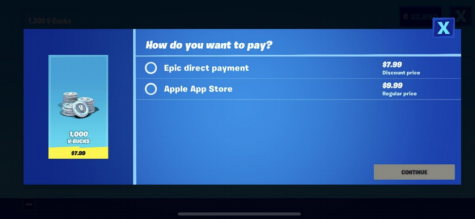Apple vs Fortnite: Let the (Legal) Games Begin
A lawsuit against two tech giants may change the way you buy in-game currencies.
Epic Games, owner of popular Battle Royale game Fortnite, has filed antitrust lawsuits against Apple and Google in response to the tech giants’ removal of Fortnite from their app stores. On August 13th, a new update to the iOS and Android versions of Fortnite violated Apple and Google policies by introducing a direct payment system, circumnavigating a long time fee applied to app developers. Upon Fortnite’s removal from the App Store and Google Play Store, Epic immediately filed the two lawsuits, implying that Epic Games has, for some time now, planned to challenge the iron grip Apple and Google have on app developers.

The lawsuits, filed by Epic Games against Apple and Google, are protests against the tech giants’ 30% transaction fee, a fee applied to apps that require the user to purchase it from the developer or contain in-app purchases. For example, until August 13th, when consumers bought V-bucks, Fortnite’s in-game currency, 70% of purchase revenue went to Epic Games, and 30% went to Apple or Google. App developers must agree to this condition in order to make their apps available to consumers on the App Store or the Google Play Store.
When Fortnite was updated on August 13th, Epic Games updated the app through a side server, circumnavigating review by Apple and Google, which all app updates must undergo. This allowed Fortnite to include their new direct payment system. The in-app purchases available in the Fortnite store were also discounted 20%, a move to show consumers what prices would look like without the transaction fee. In response, Apple and Google removed Fortnite from their app stores, and Epic Games immediately filed the two antitrust lawsuits. The lawsuit against Apple has been highly publicized because of Epic Games’ release of a parody of Apple’s 1984 commercial for the Macintosh. The original Apple commercial is based on George Orwell’s 1984, a novel that depicts a technologically advanced police state. In the original Apple commercial, Apple insists that upon the release of Macintosh, “1984 won’t be like 1984”.

Fortnite’s parody, featuring Fortnite characters, urges its players to “join the fight to stop 2020 from becoming ‘1984’,” portraying Apple as the tech dictatorship it promised not to be. Epic did not release a youtube video against Google, but in their lawsuit they focus on the hypocrisy of Google’s “Don’t be Evil” motto. Their choice to villainize Apple publicly, as opposed to Google, is due to the fragility of the Google lawsuit. Although similar to Apple in its handling of apps and transaction charges, Google asserts less control over Android app developers and allows for more competition in their market in the form of two app stores (the Google Play Store and the Samsung Galaxy Store) and the allowance of app downloading from outside either one of these stores. This makes Epic’s monopoly claim shakier, making them reluctant to push their Google lawsuit into the limelight. The Google lawsuit has not moved forward yet.
The civil antitrust lawsuit filed by Epic Games against Apple asserts that Apple has a monopoly over the tech industry and is “seeking to control markets, block competition, and stifle innovation.” In the documents filed, Epic Games argues that Apple’s control over iOS app developers in the form of the Apple Store is a way to crush competition, violating United States antitrust laws, which exist to protect fair competition in our economy. Unlike on Android phones, the only way to download an app on Apple devices is through the App Store. Apple owns the App Store, giving it total control over which apps are made available on iOS. By providing no other means for users to download apps on iOS, and by prohibiting developers from offering payment systems that don’t give a portion of their profits to Apple, Apple has a monopoly over iOS apps, violating US Antitrust laws.

The lawsuit, and Fortnite’s removal from the Apple App Store continues, as of September 2nd. New updates to Fortnite will no longer be available to iOS users, and may not be for a while, as the case promises to be a long one. Judge Yvonne Gonzalez Rodgers, a US district judge of the US district court for the Northern District of California, and the judge on the case, ruled on August 25th that Apple will be allowed to keep Fortnite off the App Store, stating that Epic Games “strategically chose to breach its agreements with Apple.” She also issued a restraining order against Apple, which keeps Apple from withdrawing access to Epic Games’ Unreal Engine, a suite of tools for app developers. Both Apple and Epic Games refuse to back down, Epic in its defense of app developers, and Apple in its defense of its own policies and ability to control what happens on its operating system. Epic says it can be prepared to argue its case in court in four to six months, while Apple has stated that it may need more than 10 months to prepare for the trial. In any case, iOS users may want to buy a gaming console or PC if they want to experience the newest season of Fortnite, which began on August 27th.







Alex • Sep 30, 2020 at 11:01 am
Way to go Fortnite. I think that all other companies should be this strong. Especially with all the haters saying Fortnite is dumb! It must be hard for them.
Mackenzie Saiz • Sep 8, 2020 at 6:35 pm
this is cool but I do not like fortnite I do not see the point in it. It is a dumb game.